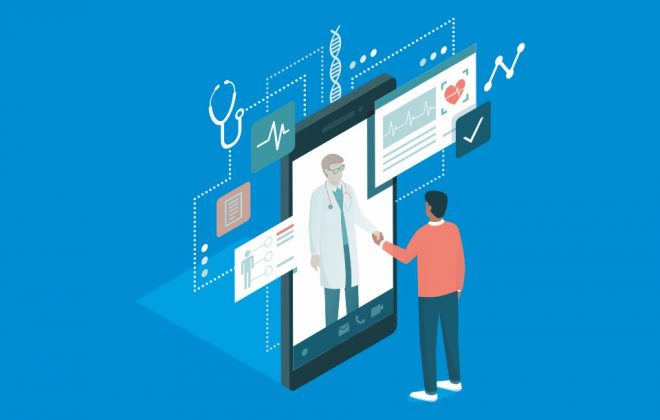Electronic Health Records and Hospital Information Systems – What Do You Really Need?
The number of healthcare providers and hospitals using electronic health records and Hospital Information Systems (HIS) has grown drastically over the years. According to research reports, 98% of the hospitals have demonstrated the meaningful use of EHR systems and the global EHR market on the ambulatory side is set to grow at 5.8% which is mainly driven by the need to reduce healthcare costs and deliver quality and improved healthcare to patients.
With the adoption of these technologies, healthcare management has reached a new level, where healthcare practitioners have been able to reduce health related costs, improve efficiency in the processes and deliver improved healthcare to their patients.
Here we have shared our insights about EHR and HIS and outlined some of their key benefits and discussed their growing importance in improving the modern healthcare system.
What are Electronic Health Records and why do we need them?
Electronic Health Records are detailed records comprising of health information about patients which are generated by healthcare providers. It typically contains all vital information right from patient demographics, contact information, medical history, allergies, past and present medications, lab reports including immunizations.
The main purpose of EHR is to deliver the most comprehensive and accurate health information which can be shared across with the patients’ other healthcare providers. With EHR, it’s possible to navigate through the entire medical history of the patient and patient information is available and can be retrieved easily.
Key benefits of EHR
Provides accurate information about patient’s health status
Healthcare providers can provide the best possible care during routine visits as well as during emergencies with the use of EHR. It helps them in sharing and accessing the information needed to evaluate the present condition of the patients with regard to their health history and medical treatments.
Better way to share information about patients with family and caregivers
EHR provides greater flexibility and convenience to patients and their families by enabling their greater participation and involvement in the key decision-making process concerning the patient’s health, which results in better healthcare outcomes.
Improves patient safety and reduces errors
Apart from maintaining patient records of medications and allergies, EHR also checks for any problems automatically, whenever new medications are prescribed and provides alerts to the physicians of possible contraindications with the new medications. Besides, they may be used for recognizing and correcting operational issues quickly, which may not be possible using a paper-based system.
What are Hospital Information Systems and their core benefits?
In today’s healthcare system, the use of Hospital Information Systems (HIS) plays a vital role in making the healthcare processes more fast and efficient for the healthcare providers and hospitals. In multi-specialty hospitals especially, it’s a huge challenge to maintain the records of patients manually, who come in and go every day. This is where HIS becomes valuable in managing the clinical, financial, and administrative aspects of the hospital along with its inventory.
Need for HIS in hospitals
HIS is the key system in hospitals that manage transactional processes related to data entry right from patient registration, admissions to discharge information. It acts as the main database for storing of all transactions related to the hospital and contains all reports and census pertaining to patient counts, financial reports and the number of admissions.
Key Benefits of HIS
Cost effective process
A good and efficient HIS system, if well-implemented, can reduce a lot of manual work involved in hospitals related to record keeping and documentation. Due to automation, costs of labor may be cut down as there is no manual intervention required for storing or analyzing information.
Increased data security and easy retrieval
Data security is of paramount importance in hospitals and providing authorized access to key individuals comes with a risk at times along with making data retrieval also a cumbersome process. HIS can effectively tackle both these challenges as all the data is stored on the server or cloud which can keep it safe and secure. It also makes it easy to provide controlled access to data using individual logins.
Improved patient care and healthcare outcomes
HIS aids in faster and more efficient clinical decisions by healthcare providers with increased access to patient data. Besides, with automation, every department in the hospital is inter-connected which provides faster information and it’s quicker to get diagnostic reports of patients leading to faster process of recovery and enhances the quality of patient care.
Choosing between EHR and HIS
Electronic Health Records enables easier collection, storage, and sharing of health-related information related to patients for healthcare providers which assists in coordinated care delivery. With the use of electronic health records, access to patient records, critical test records, and progress notes is faster which helps in reducing delays in treatments that may result due to missing data.
Hospital Information System has become quite advanced these days with new technologies and innovation being introduced. To get the best results from their HIS investments, the hospital employees must gain a complete understanding regarding its usage. The system must be user-friendly and also provide essential training and must not be just restricted to patient care or financial management. A good HIS system must be affordable, scalable and focused on both patients and the medical staff.
Conclusion
Electronic Health Records and Hospital Information Systems have their own place in healthcare management in delivering better healthcare outcomes and quality patient care. Both are essential in managing different aspects of healthcare and making the healthcare process more fast and efficient.




